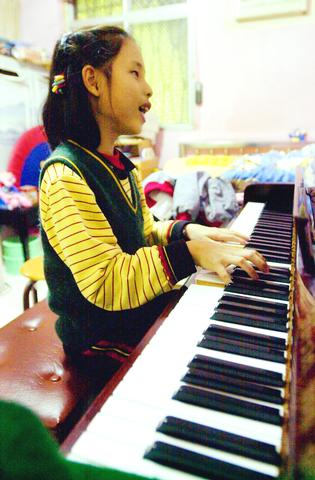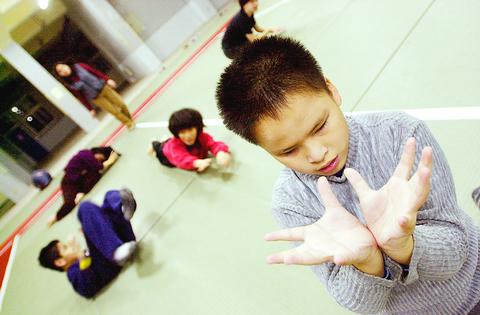The Wan-nian Borough (萬年里) in Taipei was filled with warmth over last weekend's gloomy winter weather.
Organized by borough head Lai Shan-sung (賴賢松), residents in the neighborhood participated in a discussion to assist Hsu Fu-ya (許富雅), an eight-year-old blind girl in the community.

PHOTO: CHEN CHENG-CHANG, TAIPEI TIMES
Yaya, as Hsu was nicknamed, has damaged retinas due to her premature birth.

PHOTO: GEORGE TSORNG, TAIPEI TIMES
"Hsu Wen-chi (徐文志), Yaya's circuit instructor, said she needs more interaction with people other than her family. So about 60 volunteers have been recruited to spend time with her," said Lai.
Circuit instructors in Taiwan provide assistance to visually impaired students within a particular city or county.
Yaya has an excellent academic record. "I love knowledge," she says full of self-confidence.
"Yaya has no problems with learning. I worry more about how she can develop normal interpersonal relationships with other people," said Lin Chung-chuan (林忠勸), Yaya's mother. She sent Yaya to a regular primary school.
"[Interaction with people with full vision] must start from now or it'll be too late," she said.
Many Taiwanese parents of blind students send their children to regular schools for this reason.
"I want my daughter to enjoy life with many different friends like I do," said Chen Chen-ling (陳貞玲), a mother whose blind child she sent to a regular school.
The encouragement of mainstream education for handicapped students has been a policy of the education authorities since 1945.
Learning from others
"Students in schools for the visually impaired lack crucial interaction with society," said Li Yung-chung (李永昌), associate professor from the special education department at Kaohsiung Normal University (高師大).
"Blind people cannot cultivate reasonable social behavior by observing and imitating what others do," Li explained. "They need advice from sighted people."
Li said that Wang Chun-Chieh (王俊傑), a blind musician, told him that interaction with sighted people had helped him to correct aspects of his social behavior.
Yaya's experience supports Li's comments. "Yaya previously always wanted to touch other peoples' faces to `feel their appearance.' I had to remind her that such behavior is offensive," Lin said, "I hope more people can help correct her behavior."
Specialists say it is crucial for visually impaired students to develop good social interaction skills that can help them to get help with their basic education in primary school. But to do so is a great challenge for these students.
Li's research shows that blind students are less accepted by their sighted peers in primary school and Li and many parents of visually impaired children say these students generally have inferior interpersonal relationships.
But currently not all teachers who have visually impaired students in their classes have received training in the appropriate teaching methods and skills.
"I had to spend two months communicating with all the instructors ... to have my daughter accepted," said one mother.
Sarina Yeh (葉姿吟), deputy managing director of the Premier Foundation (拍得麗文教基金會), said some experienced teachers have difficulties accepting visually impaired students. The Premier Foundation provides education programs for the visually impaired.
"They are hardly likely to change a teaching model they have followed for years just for these students," she said. A mother whose daughter was once rejected by an teacher with over 10 years' experience seemed to prove the point.
Hsu, a circuit instructor for more than a decade, said many teachers fear shouldering the burden of teaching these children, adding that instructors teaching visually impaired students without special educational training are not provided with extra pay for the extra duties involved.
"Currently, visually impaired students are simply placed in classes at random. Teachers that are not ready for that in advance may panic," he said.
Some parents said teachers had asked visually impaired students "why don't you just go study in the special schools?"
"It's just a matter of whether they are willing to help our children," argued Chen Yi-jen (陳宜人), whose visually impaired daughter is a fifth-grade student in a regular school. "Communication with parents can make the teaching easier."
Hsu said that the attitude of instructors can serve as a model to the class. "Sighted students will help their handicapped peers if the teacher also does so."
Orientation training -- learning to memorize their environment on the basis of set fixtures and fittings -- is an example and teachers and students can join in helping visually impaired students to familiarize themselves with the school and classroom.
Parents embracing mainstream education to allow the development of better social skill on the part of their children may be disappointed by the obstacles thrown up to their children's academic achievements.
The academic performance of visually impaired students influences the way their peers view them. The better their interpersonal relationships are, the more help they can obtain with learning, say specialists.
"Children are also aware that they are functioning in a power structure. They cling together with those who perform well academically," Hsu said.
Adapting methods
Certain subjects are particularly difficult for the visually impaired to master.
Without the visual experience of space, learning mathematical concepts based on three dimensions is especially difficult for the visually impaired. They may also feel uneasy in physical education and handicraft class, because they cannot view and then imitate demonstrations.
The ability of instructors to adjust to teaching visually impaired students plays a vital role in determining the quality of education these students receive, say experts and parents.
Li said some teachers who have no training in special teaching methods for visually impaired children simply give up on these students.
Li said teacher in Southern Taiwan once told his class that his visually impaired student was "covered in gold powder" (充滿金粉), which is a Hokkien expression meaning that somebody is to be isolated.
"This deprives the student of learning opportunities," said Li. It is recognized that outside Taipei City, many still have a poor understanding of how to interact with visually impaired students.
Some instructors had worsened these students' difficulties by overlooking their needs. An instructor might, for example, teach the time by moving the hands on a model clock but overlook to narrate the movement of the hands for the handicapped student.
Chen said her daughter was excluded from the handicraft class. "She always reads alone while the others are enjoying the class because the teacher hasn't got time for her."
"One teacher told his blind student who left the class for a visit by the circuit instructor, `Here comes your real teacher,'" Li said. "The student learned little when the teacher didn't consider him a member of his class."
Circuit instructors are also important to these students. They visit the students once or twice a week. "But the visit of the instructor is not enough," said Tang Wan-ling (譚文玲), whose daughter now studies at home instead of school due to a serious kidney disease.
She also complained that the instructors get replaced every two years. "Besides, they cannot handle all the subjects," she added.
Hsu said Taipei City, with over 100 visually impaired students, has a shortage of instructors, there being only about seven circuit instructors in Taipei. The situation is worse outside the capital.
"Many trained instructors have left for administrative positions because the education bureaus need people. They gave up circuit teaching at the request of the bureau and out of a sense of being unrewarded," Hsu said. "They may regard such teaching as stressful with poor feedback."
Li said that most would return to mainstream teaching after fulfilling their contracts with the government, which are valid for two years.
Substitute teachers without special training are allowed to take care of circuit instructing. A circuit instructor like this can be incapable of deciding who needs the service. A boy who is blind in one eye only was misunderstood as in need of special assistance. He was removed from mainstream classes to meet the unqualified circuit instructor. Only then did he begin to feel conscious of his "abnormality."
Li said one southern county does not even have a single circuit instructor qualified to teach blind students.
Other problems
Poor provision of teaching aids to help visually impaired students understand the lessons is also a problem. "The government subsidizes the provision of teaching aids in school, but it's not enough," said Tang. She said the available teaching materials are not always helpful either. "Now each school can choose their own textbooks. So materials good for blind students in one school may not fit the needs of those in another ...," she said.
Some local governments do not provide laptop computers specifically designed for visually impaired students. "Then the students have to waste time repeatedly listening to the recording of the class after going home," said K. J. Tang (湯國基), chairman of the Blind Education Concerns Association in Taipei (關懷盲人教育協會).
Parents have also complained about the provision of Braille textbooks. "Our children get the textbooks for the semester almost one month after the semester begins," they complained. "I have to read the textbooks for sighted students for my daughter until the braille one comes in," said Ho.

‘ABUSE OF POWER’: Lee Chun-yi allegedly used a Control Yuan vehicle to transport his dog to a pet grooming salon and take his wife to restaurants, media reports said Control Yuan Secretary-General Lee Chun-yi (李俊俋) resigned on Sunday night, admitting that he had misused a government vehicle, as reported by the media. Control Yuan Vice President Lee Hung-chun (李鴻鈞) yesterday apologized to the public over the issue. The watchdog body would follow up on similar accusations made by the Chinese Nationalist Party (KMT) and would investigate the alleged misuse of government vehicles by three other Control Yuan members: Su Li-chiung (蘇麗瓊), Lin Yu-jung (林郁容) and Wang Jung-chang (王榮璋), Lee Hung-chun said. Lee Chun-yi in a statement apologized for using a Control Yuan vehicle to transport his dog to a

INDO-PACIFIC REGION: Royal Navy ships exercise the right of freedom of navigation, including in the Taiwan Strait and South China Sea, the UK’s Tony Radakin told a summit Freedom of navigation in the Indo-Pacific region is as important as it is in the English Channel, British Chief of the Defence Staff Admiral Tony Radakin said at a summit in Singapore on Saturday. The remark came as the British Royal Navy’s flagship aircraft carrier, the HMS Prince of Wales, is on an eight-month deployment to the Indo-Pacific region as head of an international carrier strike group. “Upholding the UN Convention on the Law of the Sea, and with it, the principles of the freedom of navigation, in this part of the world matters to us just as it matters in the

BEIJING’S ‘PAWN’: ‘We, as Chinese, should never forget our roots, history, culture,’ Want Want Holdings general manager Tsai Wang-ting said at a summit in China The Mainland Affairs Council (MAC) yesterday condemned Want Want China Times Media Group (旺旺中時媒體集團) for making comments at the Cross-Strait Chinese Culture Summit that it said have damaged Taiwan’s sovereignty, adding that it would investigate if the group had colluded with China in the matter and contravened cross-strait regulations. The council issued a statement after Want Want Holdings (旺旺集團有限公司) general manager Tsai Wang-ting (蔡旺庭), the third son of the group’s founder, Tsai Eng-meng (蔡衍明), said at the summit last week that the group originated in “Chinese Taiwan,” and has developed and prospered in “the motherland.” “We, as Chinese, should never

The High Court yesterday found a New Taipei City woman guilty of charges related to helping Beijing secure surrender agreements from military service members. Lee Huei-hsin (李慧馨) was sentenced to six years and eight months in prison for breaching the National Security Act (國家安全法), making illegal compacts with government employees and bribery, the court said. The verdict is final. Lee, the manager of a temple in the city’s Lujhou District (蘆洲), was accused of arranging for eight service members to make surrender pledges to the Chinese People’s Liberation Army in exchange for money, the court said. The pledges, which required them to provide identification